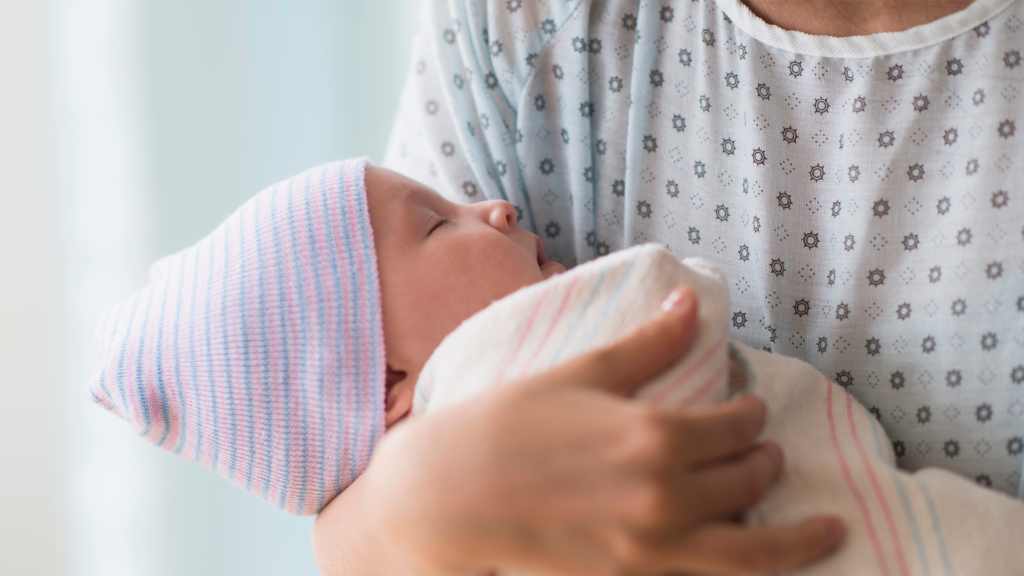Preparing for baby is an exciting time for new parents. But, with excitement comes stress. What will my birthing plan look like? What facility will I choose? How can I best prepare to adjust to life post-birth? Fortunately, there are designated hospitals and birthing centers that work to ensure that new parents and their children are provided with the support they need. These are known as Baby-Friendly facilities.
What is a Baby-Friendly facility?
A designated Baby-Friendly facility is a hospital or birthing center that is focused on providing optimal care for parents and babies with bonding and infant feeding practice, support, and care for the entire length of the breastfeeding experience.
“The major component of Baby-Friendly is following the Ten Steps to Successful Breastfeeding,” says Kim Forsline, Fairview Range RN, IBCLC (International Board Certified Lactation Consultant). “They were developed by experts following evidence-based practice to increase the percentage [of mothers] who start breastfeeding, and then to also increase the duration of breastfeeding. It’s a world-wide initiative from WHO (World Health Organization) and UNICEF (United Nations Children’s Fund).”
“Most people don’t know what Baby-Friendly is,” adds Derek DuSold, Patient Care Supervisor at Fairview Range. “There is a long journey and process to getting there [and to making] every aspect for birthing mothers and their babies better than before.”
According to DuSold, Fairview Range is among less than 5 percent of hospitals right now to obtain the Baby-Friendly Designation—a title that strives for excellence to ensure every aspect of having a baby is understood for the parents and that the child is receiving the best care possible.
According to Baby-Friendly USA, there are currently 500 hospitals and birthing centers that have reached the status as Baby-Friendly in the United States. It’s a milestone that continues to grow as more facilities are understanding the benefits that come from this designation.
What constitutes a Baby-Friendly Facility?
Four important aspects that are detailed in the Ten Steps to Breastfeeding include providing the educational resources and support parents need to understand breastfeeding, promoting initial skin-to-skin contact, explaining the benefits of rooming-in, and offering ongoing support for growing families.
Promotes the benefits of breastfeeding
Baby-Friendly facilities strive to ensure that mothers and fathers are educated about every aspect of the birthing process, including the benefits of breastfeeding.
“The choice of whether to feed a baby breast milk or formula is always the choice of the parents,” says Amy Tuthill, Nurse Practitioner in Women’s Health at Fairview Range. “We want to make sure that parents have the most accurate, research supported, up-to-date, and unbiased information available in order to make that decision.”
Derek DuSold adds that the benefits of breastfeeding are numerous for both mom and baby, “For mom it reduces risk of breast cancer, ovarian cancer, decreased risk of type 2 diabetes, it helps with blood pressure, and with postpartum depression (PPD). And for baby, the bonding positively impacts the child. Babies statistically have better outcomes—long term studies have shown that [breastfeeding] helps lower infant mortality rates, lower chance of SIDS, statistically lower rates of chronic disease later in life, reduced allergies, and they tend to get higher test scores in school.”
Breastfeeding can be a challenge for new mothers. However, thanks to Baby-Friendly facilities, the number of breastfeeding mothers has increased tremendously due to the education provided by hospital and birthing center staff.
“Data from initial initiation rates sent to BFUSA in 2013 found that 40-50 percent of mothers wanted to breastfeed, the rest said it was too difficult or chose formula,” DuSold explains. “Last month the initiation rate was 86 percent because of our Baby-Friendly practices.”
Promotes the benefits of skin-to-skin contact and the “golden hour”
Bonding is incredibly important for both parents and baby. Baby-Friendly facilities emphasize the importance of the “golden hour,” or the hour immediately after the baby is born that promotes uninterrupted contact so mom and baby can be alone to bond.
In the past, a new mom would hand her baby to a nurse who would examine and weigh the child, and perhaps provide a shot before swaddling them in a blanket and giving them to the new parents. Today, research has shown that immediate skin-to-skin contact is the best way for a mother and healthy newborn to bond. Nurses can conduct the physical examination of the baby while it is on the mother’s chest and provide the conventional procedures after the first feeding.
“This was a big change to our workflow,” adds Forsline. “We learned what was best for our newborns, versus, getting our boxes checked on tasks needing to be done. We now look at the first feeding as the priority, not weights and measurements. “
Practice rooming-in and bonding for mother and baby
“Rooming-in” encourages mother and baby to stay together both for breastfeeding and to form a strong bond. This practice means, for both parents, keeping your baby with you continuously, day and night. A parent’s instinct is for their child to be safe and close, and studies have shown that it is best for parents and babies to stay together after birth (with the exception of a medical condition). Rooming-in makes it possible for skin-to-skin contact, helps the baby to cry less, and get breastfeeding off to a good start. Parents will also have the opportunity to learn and recognize their baby’s needs. The practice also encourages families to wait at least an hour before introducing the baby to additional family and friends so the hormone oxytocin (the same hormone that causes your uterus to contract) will be released to stimulate “mothering” feelings.
Family and friends may suggest that a nursery is the best place for the baby so parents and baby can both get rest; however, studies have shown that mothers whose babies are in a nursery don’t get any more sleep than mothers who room-in with their babies at night. For many mothers and fathers, they can rest best when they know their babies are safe with them.
Fostering support for growing families
The benefits of Baby-Friendly have positively impacted hospitals and birthing centers since Baby-Friendly USA’s (BFUSA) inception when it comes to meeting the needs of growing families.
“Baby-Friendly is why we allow fathers to be with loved ones in the operating room for C-sections,” explains DuSold.
Traditional childbirth was often left entirely up to the mothers—today, instead of remaining in the waiting room, fathers can be there to support mom and baby while also being a health advocate for them. Plus, if for medical or safety reasons a mother may not be able to have skin-to-skin contact with baby immediately after birth, a father may have the opportunity to step in.
Baby-Friendly facilities often offer a series of education opportunities for new parents preparing them for prenatal care, the birthing process, and post-birth through encouragement, information, and skills offered by each designated facility.
Conclusion
When provided with the education, resources, and support they need, new mothers can feel confident knowing that a Baby-Friendly facility will make them, and their baby, a priority. Baby-Friendly has become a turning point for birth centers and hospitals in recent years, with the designation being a lengthy and rigorous process due to the high standards set by the BFUSA.
“Out of 144 hospitals in Minnesota, 17 are Baby-Friendly, out of those 17, two are on the Range,” says DuSold. “That speaks to the dedication we have to our community.”
For more information about Fairview Range’s Women’s Health and Birth Center, please call 218-362-6641 or visit www.fairview.org/range.
Fairview Range is a family of medical providers based in Hibbing, and includes Fairview Range Medical Center, Fairview Mesaba Clinics (with locations in Hibbing, Nashwauk, and Mountain Iron), home care, hospice and a medical supply provider. Fairview Range offers more than 60 medical services, including ENT, surgery, urology, occupational therapy, cardiac rehabilitation, radiation therapy, sleep lab, sports medicine and obstetrics/gynecology, and also owns Fairview Range Greenview Residence, a memory care facility, located on the medical campus.





